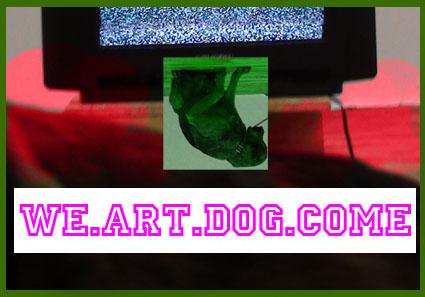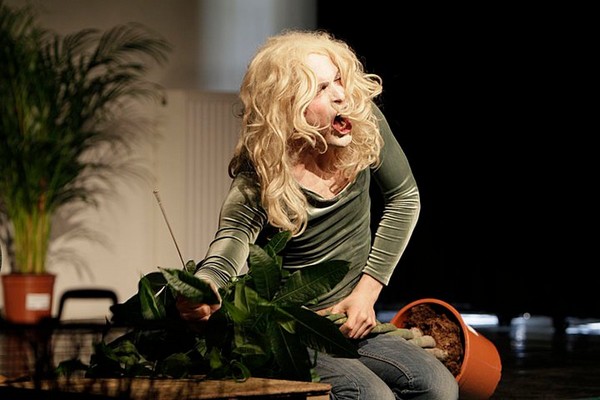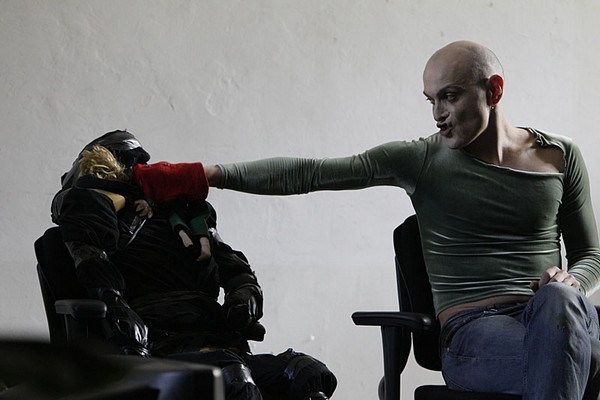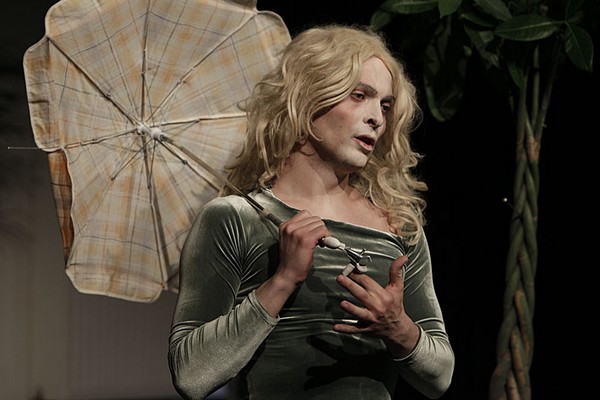Motto: I'm the hunger of all Bulgarians and Africans in this country, I'm the hunger of the worms, I'm the hunger of all my lovers from the European Institutions, I'm the hunger of the worms, I'm the hunger of all masters of theater, I'm the hunger of the worms, I'm the hunger of your subjective cultural experience, I'm the hunger of the worms..."
(Ivo Dimchev - excerpt from the text of the performance We.art.dog.come)
(Ivo Dimchev - excerpt from the text of the performance We.art.dog.come)
According to Ivo Dimchev, the first reason for which we should see his most recent creation, We.art.dog.come is the fact that it explores the border between nature and culture. This topic has been endlessly talked and written about in philosophy, sociology and anthropology, it has been in the centre of many debates related to the condition of the contemporary human being, but we must admit that it has rarely been assumed within performative contexts.
Maybe because this relation (whether it is a conflict or not) between nature and culture remains somehow a very theoretical subject, many artists were forced to keep silent about it. Ivo Dimchev openly chooses this topic and stages the exploration of the border between nature and culture, leading us to the conclusion that there must be a conflict between the two concepts.
While watching the performance, we should keep away from our ideas about what we might have read about nature and culture and try not to extend our theoretical assumptions over the performance. If we do so, we will surely fall in the trap of our own subjective views and fail in getting to the point of the performance. But... what this point may be? Are we really led to a certain point?
We subsequently see the stage being populated by three performers, a dog, a TV set with a white broken image active all along the performance, some plants (they seem natural...), a cage containing big needles, then six puppets looking like burnt down bodies, fake flowers invading the stage, the dog left alone and leashed within this scenery...
But, where are we? The key-dialogue of the performance sheds a light upon this question:
- Hey Christian, do you know where we are?
- NO.
- We are in the middle of someone's subjective reality. How do you feel?
- Strange...
- Strange is good...
The question that may naturally arise in the mind of the spectator is: "Where am I? Am I watching THEIR subjective reality from MY subjective reality, or am I completely contained by this subjectivity he is talking about?" The fact is that we will never know. As long as a term like subjectivity is brought in the picture, anything can be assumed, nothing is objective and nothing can stand as a universal principle. We are caught in the trap of subjectivity like creatures caught in a cage, thinking they are birds, when they may be only big needles dreaming of flying...
As cultural beings, we have learnt that God functions like a universal principle, that our mind is able to have access to the idea of God. This is the point where the conflict between nature and culture starts. We think we have powerful minds able to receive God within their limits. This is how we become more and more cultural, never questioning our nature, taking our nature for the nature of God and vice versa. Thus, God becomes a hostage within the borders of our limited thinking, like a dog in a leash, caught in the trap of our subjectivity.
All that happens on stage during this performance must be regarded like an exercise of subjectivity which may be easily considered a synonym to honesty. Ivo Dimchev accompanies us through a labyrinth of situations and assumptions that may be very personal: from the death of a dog to the condition of the contemporary artist, from the" hunger of the worms" to the "representation of God", from the conversation of two men to the simulation of a couple that may work in our cultural representation like a distorted image of the originary couple Adam and Eve, everything feels like an evanescent flow of images on a screen that we will never have full access to...
In the end we find out that the dog "represents God" and he must be left alone. The dog represents God in this subjective reality assumed from the very beginning. The performers leave the stage... and the dog. What they will enter, we will never know, we are not allowed to creep into another possible subjectivity that may start beyond the door closed in front of us. Just the way we will never know what the tattoo shown to the end of the performance on Ivo Dimchev's body stands for... And it must remain this way. The tattoo in the form of an "S" will surely invite to interpretations. All of them may be valid and none may be true. The "S" may be the key to the source of representations in this subjective reality we are caught in / or witnesses to, but we shouldn't be looking for any answer that would deepen the trap. We are free to leave the room after the end of the show and enter another subjectivity, ours or somebody else's, we are free to walk the streets with God trapped within our limits of thinking. And the representations of God may take innumerable shapes...
"I am the hunger of your subjective cultural experience" is one of the sentences that will float around the minds of many spectators... This sentence was formulated within the subjective context assumed in the performance and it is one of the endless possibilities. The representation of the hunger of everyone's subjective cultural experience is another piece in the scenery of the trap...The same trap in which the idea of God has been caught.
We.art.dog.come
Idea, text, music and choreography: Ivo Dimchev
Performers: Ivo Dimchev, Christian Bakalov, Mariyan Ivanov and Jackal
Co-Production: BudaCentrum / Kortrjik, Dansand / Ostende, KaiTheater / Brussels, Fraskati / Amsterdam, Dasarts / Amsterdam, Volksroom / Ivo Dimchev, Impulstanz / Vienna, Humarts Foundation / Sofia
Photo: Thomas Lenden
Premieres: 3,4 December 2010 - Buda Kortrjik /Belgium, NEXT Festival.




